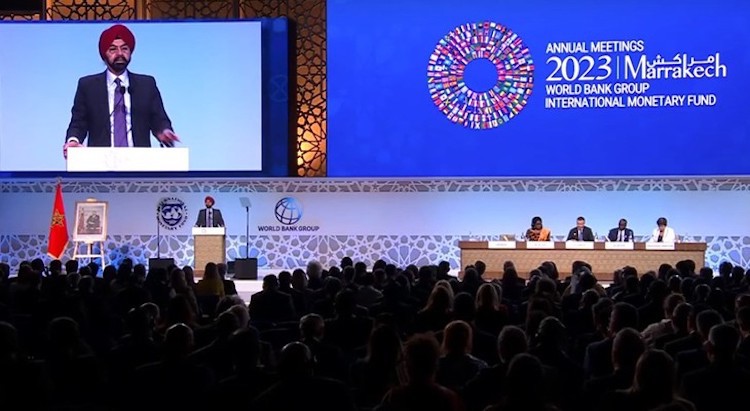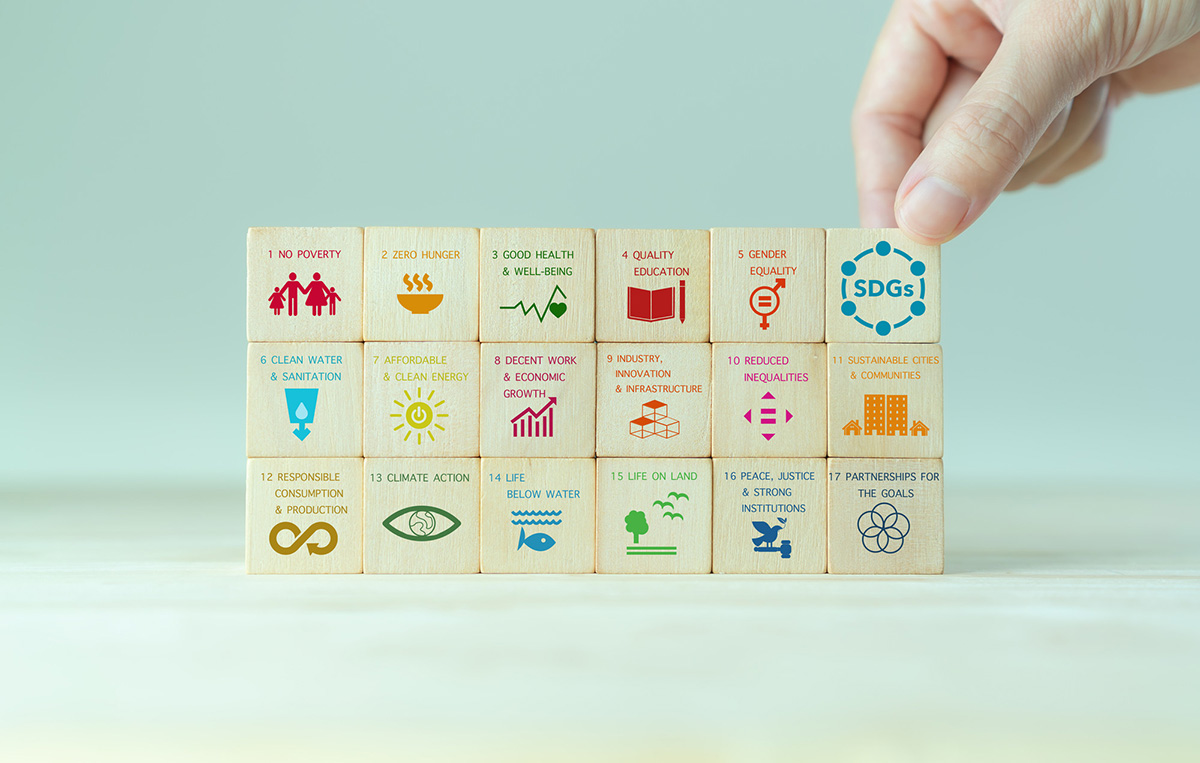By Kalinga Seneviratne
SINGAPORE | 22 October 2023. (IDN) — “Economic growth in much of the developing world is retreating,” warned World Bank’s new President Ajay Banga in his keynote speech at the recent meeting of the World Bank (WB) and IMF (International Monetary Fund) held in Marrakech from 9 to 15 October). Pointing out that the world is heading for declining economic growth with over 100 million pulled into poverty, with debts increasing throughout emerging markets—doubling in Africa—a“shackling countries to the ground just as they’re trying to rise”.
The Indian-born Banga, the first person of colour to hold this position in the 79-year-old bank, added, “we are living in a world with alarming challenges but at a time of intensifying polarization and extremes. Beneath the surface, a growing mistrust is pulling the Global North and South apart, complicating the prospect of progress”.
In his hour-long speech, Banga spoke about the need for the WB to reform itself to addressing the distressing needs of the global community. He talked about writing a new playbook for a new mission for the bank, “one that will drive impactful development and lead to a better quality of life”. He also noted that “we cannot defeat poverty with half the world’s population on the sideline”.
He insisted that the World Bank and other multilateral development banks don’t have a monopoly on good ideas. “We should steal shamelessly and share seamlessly. And we must do it with think tanks, the private sector, civil society, and anyone who is moving the needle” he said, adding, “there is much we can do together but this commitment to impact begins with ourselves”.
But, will he be given the support from within the two institutions to get the broader international community into the decision-making process of the two Bretton Woods institutions formed at the end of the Second World War by Western powers, who ruled much of the non-Western world at the time?
As Vikram Khanna, associate editor and senior columnist of Singapore’s Straits Times argues, both the WB and IMF need reforms because these have been subverted by major (US and European) powers. “At its recent summit in New Delhi, leaders of the Group of 20 (G-20) committed to reforming these institutions, many of whose rules and traditions have hardly changed since their inception,” noted Khanna, pointing out that for almost 80 years, the IMF has been headed by a European, while the WB by an American (Banga became a naturalized American in 2007).
“Nowhere in the articles of agreement of these institutions is it stated that this must be the case,” he says. Despite a commitment in recent years to “an open, merit-based and transparent selection process, this has not been honoured”.
Khanna points out how the two Bretton Woods twins vetoed loans to Vietnam from the 1970-1990s, while gave 30 times its borrowing quota to Greece during the Euro-zone economic crisis from 2010-15 that amounted to $34 billion.
Laying down debt traps
In her book ‘Fate Worse Than Debt’ published in the 1990s, development economist Dr Susan George illustrated how the IMF and WB are the messengers, the executive agents, the watchdogs and gendarmes for those who hold financial power in this world. The IMF helps them consolidate their power over the poor and indebted nations by making countries offers they cannot refuse.
The IMF acts as a channel to funnel public money to private banks; it puts the maintenance of bank profits at the top of the list. She has documented, in a number of books published in the 1990s, how the Bretton Woods institutions have set debt traps for newly independent countries throughout the 1970s and 1980s.
It continues, and Sri Lanka’s debt crisis in 2022 is a classic example, where 47 percent of their debts are in the International Sovereign Bond (ISB) markets, dominated by Western financial institutions, obtained at high-interest rates of between 8-8.5 percent. The IMF’s so-called “bail-out” is protecting these lenders by forcing the Sri Lankan government to make domestic financial reforms to pay off the debts that is impacting on the provident funds of local workers.
During the Marrakech meeting, Banga appealed for more funds for WB’s International Bank for Reconstruction and Development (IBRD) to help middle-income countries—like Sri Lanka—which otherwise have to go to the ISB’s for loans. He did not get it, with the United States notably silent on the issue.
Oxfam slams debt-induced poverty
In a report released to coincide with the WB-IMF annual meeting, Oxfam claims that 57 percent of the world’s countries home to over 2.4 billion people are having to cut public spending by a combined $229 billion in the next five years to service debts. On current terms, low- and lower-middle-income countries will be forced to pay nearly half a billion dollars every day in interest and debt repayments between now and 2029. Entire countries are facing bankruptcy, with the poorest countries now spending four times more repaying debts to rich creditors than on healthcare.
“The World Bank and IMF are returning to Africa for the first time in decades with the same old failed message: cut your spending, sack public service workers, and pay your debts despite the huge human costs. They must show they can genuinely change to reverse the tide of widening inequality within and between countries,” argues Oxfam International interim Executive Director Amitabh Behar.
While Banga did acknowledge the problem in his keynote speech, yet at the end of the meeting after spending millions to hold this talkfest, the Bank seems to have no clear goal to reduce inequality—other than words.
As Oxfam noted, going into the meeting, two major issues were clear—to address the growing debt crisis and the need for financial resources to rejuvenate the path to sustainable development goals(SDGs). However, the solutions discussed by the World Bank, IMF and their biggest shareholders are “only going to turn the vicious circle into a vortex”. Behar said that even the $125 billion in additional lending that Banga has called for is just that —lending.
Many civil society groups attending the meeting were critical of Banga’s approach to provide more loans than grants to the poorest countries grappling with debts. “There are many countries that cannot take more loans, or they’re spending a huge, huge amount of their GDP on debt repayments,” said Mariana Paoli, head of global advocacy and policy for Christian Aid, a U.K.-based charity in an interview with Devex News in Marrakech.
“So more loans even on favorable terms like concessional loans — they’re still loans, they still need to be paid back.” Paoli advocates for more debt cancellation because without it “you can’t create more of the fiscal space to fulfill social protection, education, climate, health, etc.,” she points out.
“The need to meet the UN’s sustainable development goals will call for massive increases in financing from multilateral development institutions, of which the IMF and World Bank are the largest,” noted Straits Times in an editorial. “World Bank also need internal reforms to disburse assistance more quickly and based more on needs than political considerations. This is essential if they are to maintain their credibility and legitimacy in the eyes of their members”. [IDN-InDepthNews]
World Bank President Ajay Banga delivered a speech at the meeting on 13 October 2023. Photo: World Bank.
IDN is the flagship agency of the Non-profit International Press Syndicate.
Credit:Source link



